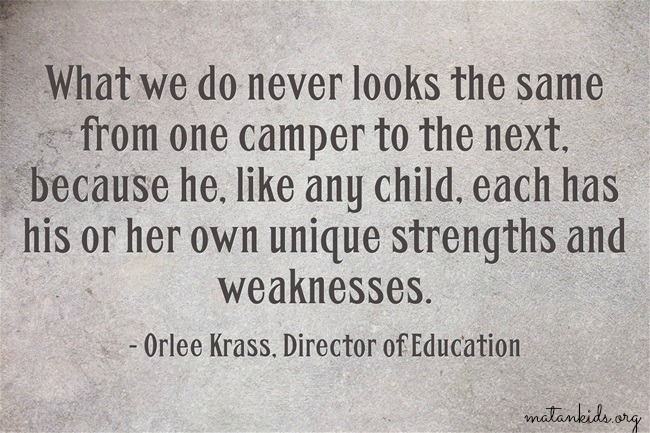The following article was written by Orlee Krass, Director of Education, for GLEANINGS: Dialogue on Jewish Education from The Davidson School of the Jewish Theological Seminary.
 My journey into the field of inclusion as a Jewish educator was kick-started by my desire for my nephew to enjoy the magic of Jewish camp that I had experienced as a child.
My journey into the field of inclusion as a Jewish educator was kick-started by my desire for my nephew to enjoy the magic of Jewish camp that I had experienced as a child.
My sisters and I grew up at a Jewish summer camp. Our mother worked in omanut (arts and crafts). We were campers, babysitters, and counselors, and ultimately I worked as a rosh edah (division head). I knew very little about children with special needs, aside from the fact that some of our campers had attention deficit disorder (ADD) and that we could go to our camp psychologist for help. Words like inclusion, modification, accommodation, and differentiation meant nothing to me.
Eventually it was time to say goodbye to my time at camp and move on to the “real world.” I became a New York City Teaching Fellow. Although I had no relevant experience, I was assigned to a school in the South Bronx to teach special education. Over the next ten years, I received the best training one could hope for through a combination of coursework, ongoing professional development, and daily, hands-on experience in the classroom, working with children with varying disabilities. Words like inclusion, modification, accommodation, and differentiation now became part of my everyday vocabulary.
During this time, I also began to work with my nephew, who was diagnosed with autism spectrum disorder more than five years ago; he is high functioning.
Three years ago my nephew was finally old enough to attend Ramah Day Camp in Nyack, New York. My family was excited that he would experience the magic of a Ramah Nyack summer. We could not wait for him to dance on the migrash (open space), sing in the zimriyah (song festival), and celebrate Israel at Yom Yisrael (Israel Day). What we did not fully appreciate at first was that all these things we remembered so fondly would be extremely challenging for him without accommodations. We quickly realized, however, that although he was high functioning, there were a lot of things in the regular camp program to which he was overly sensitive or that he could not tolerate, and his reactions were no longer considered age appropriate.
Despite the challenges the camp and counselors faced on a daily basis when working with my nephew, they really cared deeply for him and were committed to making things work for him at camp. I was thrilled when members of the staff asked if I could assist them in putting necessary supports in place to ensure a successful summer experience for him and his fellow campers. Together we worked on implementing strategies and supports such as social stories, visual schedules, and a behavior plan, all of which allowed him not only to thrive at camp but to fall in love with it, too. He was hooked. And to be honest, I was hooked too; but in a different way.
Seeing my nephew experience camp was eye-opening. Without the types of supports we put in place, he might not have had a successful summer. I did not want a Ramah experience for him or for any child with different needs to be less than successful. I was not alone. Nyack’s leadership recognized the benefit of making available the same type of support to other campers. The following summer, I returned to Nyack as a full-time staff member: director of camper care. That role did not exist when I was a camper, but I cannot imagine today’s camp going without it.
I returned to Nyack for a second summer. During these two summers, I had the unique opportunity to apply my special education training to benefit our Nyack community, and I am thrilled to be part of Nyack’s camper care team, consisting of a psychologist, a social worker, and me, a special educator. Together we work with campers, their families, their counselors, and senior staff to meet each camper’s needs to the best of our ability. What we do never looks the same from one camper to the next, because he, like any child, each has his or her own unique strengths and weaknesses. We take the time to learn about each camper, and we use a team approach to put an individualized plan into place. Our main focus is to support campers in whatever ways necessary to ensure their experiences at camp are successful and fantastic.
I loved camp as a child. I felt comfortable there and I knew it was a second home to me. As an adult, I love camp even more because of Ramah Nyack’s commitment to making all feel comfortable and welcome.
